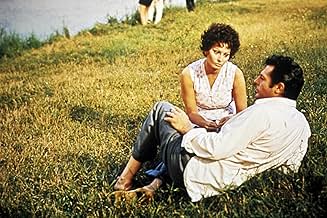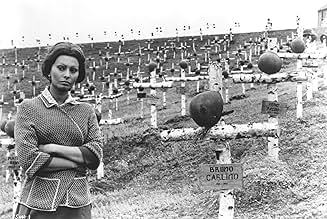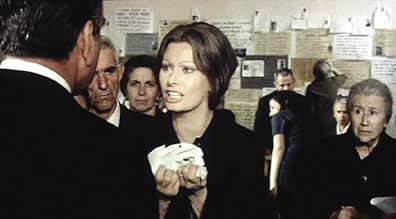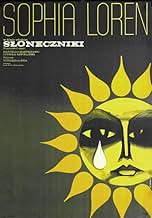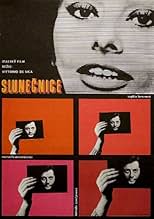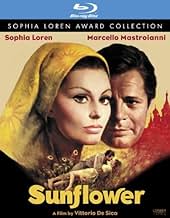IMDb-BEWERTUNG
7,3/10
4899
IHRE BEWERTUNG
Eine Italienerin sucht verzweifelt nach ihrem Mann, einem Soldaten, der in Russland als vermisst gilt - wie fünfzigtausend andere im Zweiten Weltkrieg.Eine Italienerin sucht verzweifelt nach ihrem Mann, einem Soldaten, der in Russland als vermisst gilt - wie fünfzigtausend andere im Zweiten Weltkrieg.Eine Italienerin sucht verzweifelt nach ihrem Mann, einem Soldaten, der in Russland als vermisst gilt - wie fünfzigtausend andere im Zweiten Weltkrieg.
- Regie
- Drehbuch
- Hauptbesetzung
- Für 1 Oscar nominiert
- 1 Gewinn & 2 Nominierungen insgesamt
Lyudmila Saveleva
- Mascia
- (as Ljudmila Saveljeva)
Nadya Serednichenko
- Contadina russa
- (as Nadja Cerednicenko)
Gunars Cilinskis
- Funzionario russo
- (as Gunnar Zilinskij)
Carlo Ponti Jr.
- Giovanna's Baby
- (Nicht genannt)
Mariya Sapozhnikova
- Passerby
- (Nicht genannt)
Empfohlene Bewertungen
I just finished watching the stunning Blu Ray of the original Italian English-subtitled version of this film--the best version available. I do not understand all the naysayers reviewing this film. If you are a fan of Loren and Mastroianni, if you are a fan of DeSica, if you enjoy a good old-fashioned melodrama that will tear at your heart, you MUST see this film! To dismiss this film as Soviet propaganda, or as unrealistic, is like criticizing "The Little Mermaid" for having a singing mermaid and talking fish. It utterly misses the point. This movie contains one of the very best, if not THE best Sophia Loren performance on film. Henri Mancini's score is unforgettable. This film makes you care about the plight of both characters. It is available as part of the new "Sophia Loren Collection" box set, and for me, this, along with "Marriage Italian Style," is the "jewel" of the set. See it!
Vittorio de Sica achieved a remarkable feat in this eye-catching 1970 production, bringing together Americans and Soviets, in the midst of the Cold War, in the co-production of a Franco-Italian film.
From the Americans he got a memorable soundtrack, written and directed by Henry Mancini and nominated for an Oscar. From the Soviets he received the footage from Mosfilm, directed by Andrey Konchalovskiy, as well as the actress Ludmila Saveleva.
The script by Tonino Guerra and Cesare Zavattini has everything it needs to work, but the film gets lost somewhere in between so many attributes.
The story is basic and excessively melodramatic. The soundtrack is beautiful but quickly becomes cloying. The footage of the sunflower fields and the cemeteries of Russian combatants is powerful and eloquent, but inconsequential. This is, after all, a story of the living, not the dead. Only the final notes of the fatalism of war, which determines people's fates, far beyond their individual will, remain to give the film any meaning.
But it is not enough. A final result clearly less than the sum of its parts.
From the Americans he got a memorable soundtrack, written and directed by Henry Mancini and nominated for an Oscar. From the Soviets he received the footage from Mosfilm, directed by Andrey Konchalovskiy, as well as the actress Ludmila Saveleva.
The script by Tonino Guerra and Cesare Zavattini has everything it needs to work, but the film gets lost somewhere in between so many attributes.
The story is basic and excessively melodramatic. The soundtrack is beautiful but quickly becomes cloying. The footage of the sunflower fields and the cemeteries of Russian combatants is powerful and eloquent, but inconsequential. This is, after all, a story of the living, not the dead. Only the final notes of the fatalism of war, which determines people's fates, far beyond their individual will, remain to give the film any meaning.
But it is not enough. A final result clearly less than the sum of its parts.
I went to a san francisco theatre to see this film along with my mother when I was a teenager in the 60's. It was in english and I loved it so much I saw it twice. I never forgot it, and although it was never shown again, I was told by someone a few years ago, that it was featured on one of the cable channels, and unfortunately I must have missed it. I don't think its ever been shown since. In my humble opinion, this classic movie depicting love, war, passion, separation, hope, and tears should be rated right up there along with Dr. Zhivago, Casablanca, In Love and War, and many other great films of all time. It's a pity that this movie "Sunflower" is nowhere to be found on video or better yet DVD in the english version in the U.S. I did purchase it on video in Italian, and even though I am fluent in Italian and can understand it, others in my household cannot. Can somebody PLEASE see that it gets some recognition, and becomes a familiar movie and available here in the U.S.A.?
In Naples, in World War II, the local Giovanna (Sophia Loren) has a torrid love affair with the soldier Antonio (Marcello Mastroianni), who is ready to embark to Africa. Giovanna proposes him to get married with her to get a leave of twelve days; then Antonio pretends that he is insane and he is sent to an asylum. However, the doctors discover the farce and they give the option to Antonio to go to the Russian front as volunteer instead of being sued. When Antonio is missing in action in Russia, Giovanna does not accept that he is dead. Years after the end of the war, Giovanna travels to Russia with a picture of Antonio to seek him out in the countryside. When she finds a lead in a village, her hope becomes disappointment with truth about his disappearance.
"I Girasoli" is one of the most famous romances of cinema and discloses a beautiful story of love, hope, truth and renounce. Vittorio De Sica explores the chemistry between Sophia Loren and Marcello Mastroianni to the best, supported by a magnificent cinematography and the wonderful soundtrack of Henry Mancini, which certainly is among the most beautiful ones of the cinema history. The screenplay uses much ellipsis, and my remarks are the lack of dates, leaving the viewer without any reference of how many years have passed; further, the dialogs in Russian that are not translated. My vote is eight.
Title (Brazil): "Os Girassóis da Rússia" ("The Russia's Sunflowers")
"I Girasoli" is one of the most famous romances of cinema and discloses a beautiful story of love, hope, truth and renounce. Vittorio De Sica explores the chemistry between Sophia Loren and Marcello Mastroianni to the best, supported by a magnificent cinematography and the wonderful soundtrack of Henry Mancini, which certainly is among the most beautiful ones of the cinema history. The screenplay uses much ellipsis, and my remarks are the lack of dates, leaving the viewer without any reference of how many years have passed; further, the dialogs in Russian that are not translated. My vote is eight.
Title (Brazil): "Os Girassóis da Rússia" ("The Russia's Sunflowers")
I suppose this film is just a maudlin melodrama, so is the music by Mancini. But then..., what a marvelous maudlin melodrama!... Why shouldn't it be? what's wrong with maudlin melodramas? If they are well done and authentic with their characters, if we get wrapped up with their emotions..., well, can you ask for anything more?
I just saw this movie on "You Tube" for the second time. I remember seen it on late TV in Italy, many years ago, and the impression was so powerful that after somebody mentioned it a few days ago --I didn't remember any more this title until they mentioned it-- I decided to look for it and watch it again, to see after so many years if the impression was still the same (so many films are a total disappointment when seen for a second time years later), but it wasn't the case with this one.
The story is so poignant that it can hold on its own very well no matter the change in mores and film technical improvements, it definitely grabs your interest till the very end (I must admit the film is far from perfect, since, for example, there are no indications of how many years went by or the new life style Sophia's character turns to after her Russian trip.
It also has two climaxes, both marvelous, but I think they should have decided for one or the other, two climaxes is too much within the same movie, and the length should have been shortened quite a bit.
Anyhow, forget about the lachrymose side of the story and submerge yourself in it (also get some Kleenex handy because everybody will need them, and plenty) and if you have to have a good cry, well, have it and enjoy it!! (After all is just a movie).
I just saw this movie on "You Tube" for the second time. I remember seen it on late TV in Italy, many years ago, and the impression was so powerful that after somebody mentioned it a few days ago --I didn't remember any more this title until they mentioned it-- I decided to look for it and watch it again, to see after so many years if the impression was still the same (so many films are a total disappointment when seen for a second time years later), but it wasn't the case with this one.
The story is so poignant that it can hold on its own very well no matter the change in mores and film technical improvements, it definitely grabs your interest till the very end (I must admit the film is far from perfect, since, for example, there are no indications of how many years went by or the new life style Sophia's character turns to after her Russian trip.
It also has two climaxes, both marvelous, but I think they should have decided for one or the other, two climaxes is too much within the same movie, and the length should have been shortened quite a bit.
Anyhow, forget about the lachrymose side of the story and submerge yourself in it (also get some Kleenex handy because everybody will need them, and plenty) and if you have to have a good cry, well, have it and enjoy it!! (After all is just a movie).
Wusstest du schon
- WissenswertesThe child of Giovanna (Sophia Loren) in this film was actually Loren's from her partnership with producer Carlo Ponti.
- PatzerMascia tells Giovanna that when she found Antonio, he was hurt so badly that he had forgotten everything, including his own name. If that's true, then how did Mascia know his name was Antonio?
- VerbindungenEdited into Marcello, una vita dolce (2006)
Top-Auswahl
Melde dich zum Bewerten an und greife auf die Watchlist für personalisierte Empfehlungen zu.
- How long is Sunflower?Powered by Alexa
Details
- Erscheinungsdatum
- Herkunftsländer
- Sprachen
- Auch bekannt als
- Sunflower
- Drehorte
- Produktionsfirmen
- Weitere beteiligte Unternehmen bei IMDbPro anzeigen
- Laufzeit1 Stunde 47 Minuten
- Sound-Mix
- Seitenverhältnis
- 1.85 : 1
Zu dieser Seite beitragen
Bearbeitung vorschlagen oder fehlenden Inhalt hinzufügen



